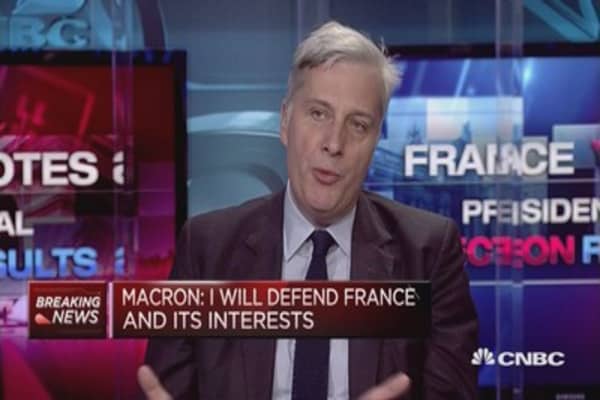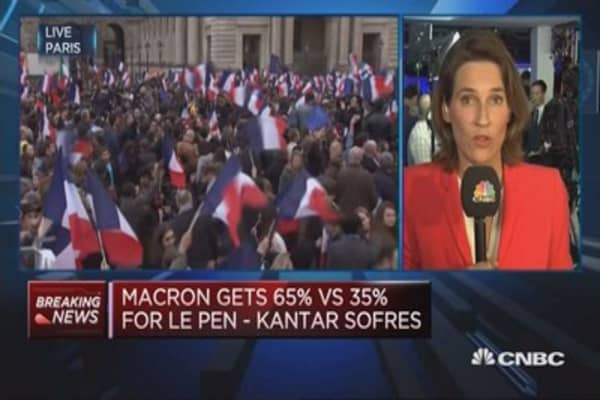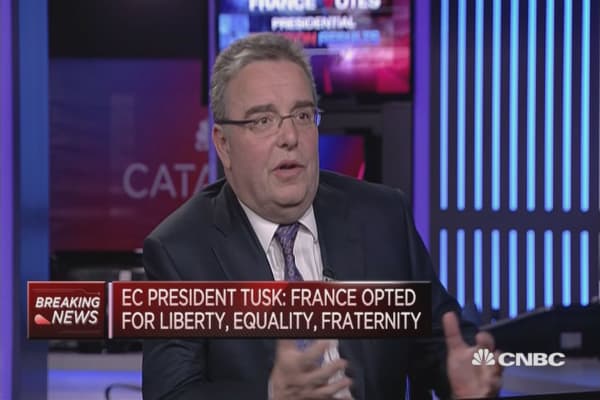Emmanuel Macron has fought off populist opponent Marine Le Pen and won the race to become France’s next president.
The centrist candidate secured approximately 65 percent of votes to far-right Le Pen’s 35 percent, according to a Kantar Sofres poll, in what has been one of the most significant elections in France’s recent history.
Macron’s win signals a victory for both pro-Europeans and pollsters, who correctly predicted his lead. CNBC takes a look at the En Marche (translated as “onwards”) party leader’s next steps towards the Elysee Palace.
What happens now?
Macron will be inaugurated within the week, with many commentators suggesting May 11 as the most likely date.
At this point he will replace the outgoing President Francois Hollande and attentions will turn to the upcoming parliamentary elections.
On June 11 and 18, French citizens will once again head to the polls for two rounds of voting to elect the country’s 577 members of parliament.
The June elections will be the first test of Macron’s presidential authority. The independent En Marche movement currently has no parliamentary seats, and without parliamentary backing Macron will be unable to enact his reform proposals.
However, the latest OpinionWay-SLPV Analytics polls – the first for the June elections – suggests that Macron is on track to win 249 to 286 seats. This would put him ahead of centrist and conservative parties’ 200 to 210 seats; the Socialist left’s 28 to 43; and the far-right National Front’s 15 to 25.
Once the seats have been filled on June 18, Macron’s next task will be to appoint his prime minister.
What does this mean for markets?
Global markets soared when Macron emerged as the front runner in the first round of voting on April 23 and will be buoyed further as the risk of an EU break-up abates.
The euro jumped to six-month highs against the dollar when markets opened Sunday evening. The single currency reached $1.1010 as fears over a Le Pen-endorsed departure were quashed.
The euro closed at $1.0995 Friday, marking a somewhat muted increase of 0.13 percent. Commentators had predicted that the euro could rise as high as 5 percent against the dollar in the days preceding the vote.
Elsewhere, the French CAC index is likely to continue its rally as markets celebrate their anticipated outcome. The benchmark reached a more than nine-year high Thursday last week after Macron appeared the victor in the final televised debate ahead of Sunday’s vote.
Meanwhile, other European bourses are expected to show relief as the integrity of the EU remains intact. Germany’s DAX broke through its all-time ceiling following Macron’s success in the first round.
However, with a Macron win largely priced in by markets, the likely duration of these gains is unclear.
At the other end, gold is likely to see some volatility to the downside in the short term at least. Typically a hedge in times of political uncertainty, the election of an establishment president could spark and unwinding in safe-haven trades.
What does this mean for French politics?
Though he is an independent candidate who brought France’s traditional ruling parties to their knees in the first round, Macron is largely considered a continuation of mainstream politics in France.
He promises major reforms in labor and taxation to boost the country’s growth prospects, as well as a 50 billion euro ($54.7 billion) stimulus package; however, his stance on fundamental issues such as EU membership and currency remains firmly with the status quo.
Nevertheless, the success of Le Pen in this close-fought race has shown the country’s deep-rooted political discontent.
With employment, immigration and continued terrorist threats at the top of people’s concerns, Macron will have a fight on his hands to win over both his fellow politicians and citizens of this deeply divided nation during his five-year term.
What does this mean for Europe?
Europe will breathe a collective sigh of relief as France’s commitment to the European project is upheld.
Under a Le Pen victory, the EU would have faced the prospect of significant overhauls, a referendum on the membership of one of its founding members, and the potential collapse of its currency union. However, 39-year-old Macron has said that he is dedicated to an outward-looking France, including maintaining its future within the EU.
“From the perspective of what it means for the U.K. I think it means it’s going to be tough, but, in fairness, given everything we’ve seen over the course of the last three weeks, we already knew it was going to be tough,” Simon Derrick, chief currency strategist at BNY Mellon, told CNBC shortly after the result.


